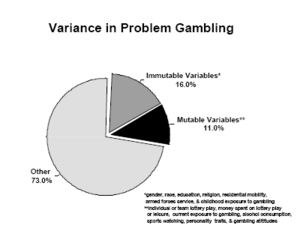A host of factors influence the development of problem gambling as well as treatment outcome. The various “causes” of problem gambling are unequally changeable by treatment; “immutable variables” such as gender, socioeconomic status, education, and religion are less of a focus in treatment than are the “mutable variables” such as lottery play, money spent on gambling, alcohol consumption, and the illusion of control as an attitude about gambling. Clinicians may focus on the “mutable variables” to offer alternative associations and attitudes which the gambler can choose to adopt. Recent research attempted to quantify the variance in problem gambling; that is, the variation in problem gambling resulting from the numerous factors that contribute to problem gambling. Hraba & Lee conducted a study surveying a random selection of 2000 Iowa households. The best “immutable” predictors of problem gambling were high residential mobility and participation in armed-forces service. The best “mutable” predictors of problem gambling were team lottery play (sharing strategies and playing the lottery with others) and money spent on the lottery. The unique variance in problem gambling explained by the “immutable variables” was 16%, while the “mutable variables” explained 11% of the unique variance. Hraba & Lee state that these predictors suggest specific considerations for preventive/therapeutic programs. Future research will help identify other factors contributing to the total explained variance in problem gambling.
Source: Hraba, J., & Lee, G. (1995). Problem gambling and policy advice: The mutability and relative effects of structural, associational, and attitudinal variables. Journal of Gambling Studies, 11, 105-121.
This public education project is funded, in part, by The Andrews Foundation.
This fax may be copied without permission. Please cite The WAGER as the source.
For more information contact the Massachusetts Council on Compulsive Gambling,
190 High Street, Suite 6, Boston, MA 02110.





